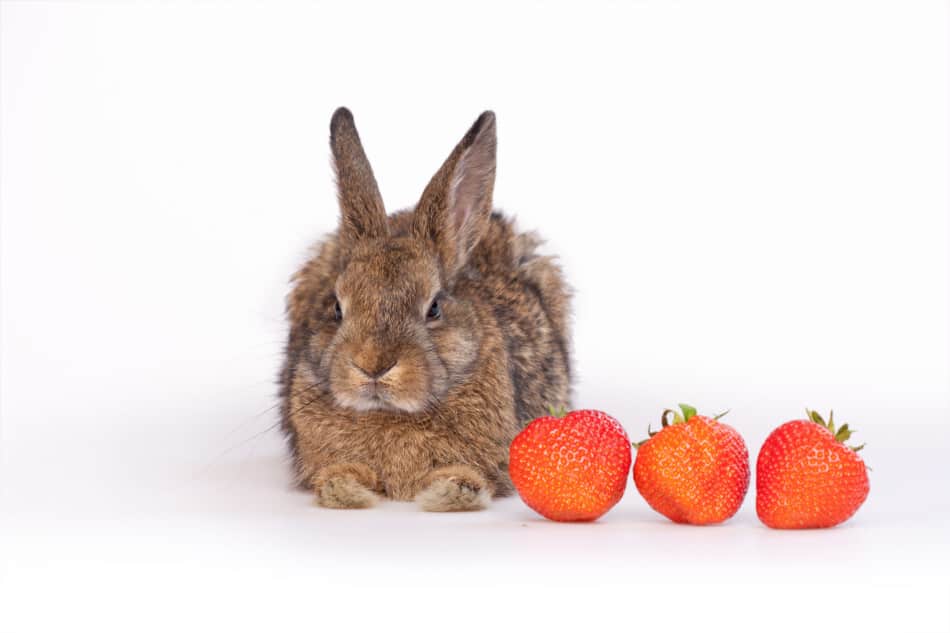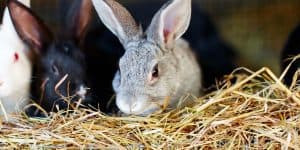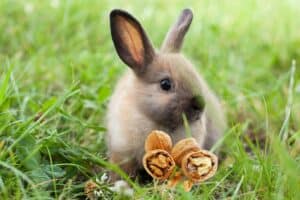Rabbits are well-known to enjoy a variety of produce. There are also some fruits, veggies and other plants that will affect them harmfully.
So, checking whether strawberries, in particular, are safe for rabbits to consume is a wise move.
The answer to your question, Can rabbits eat strawberries?
Rabbits can indeed eat strawberries – in fact, they love them. In the right circumstances, they can enjoy them safely. All you need to do is moderate the number of strawberries you feed your bunny. Rabbits like humans should not consume too much sugar.
You see, rabbits are not really made to eat a lot of sweets. The ideal diet for a rabbit consists of fiber primarily, with sugar quite low on the scale.
While fruit does offer some fiber, making it viable as a snack, a rabbit should never be allowed to eat as many strawberries as they like.
They will not know when to stop, and will quickly make themselves sick!
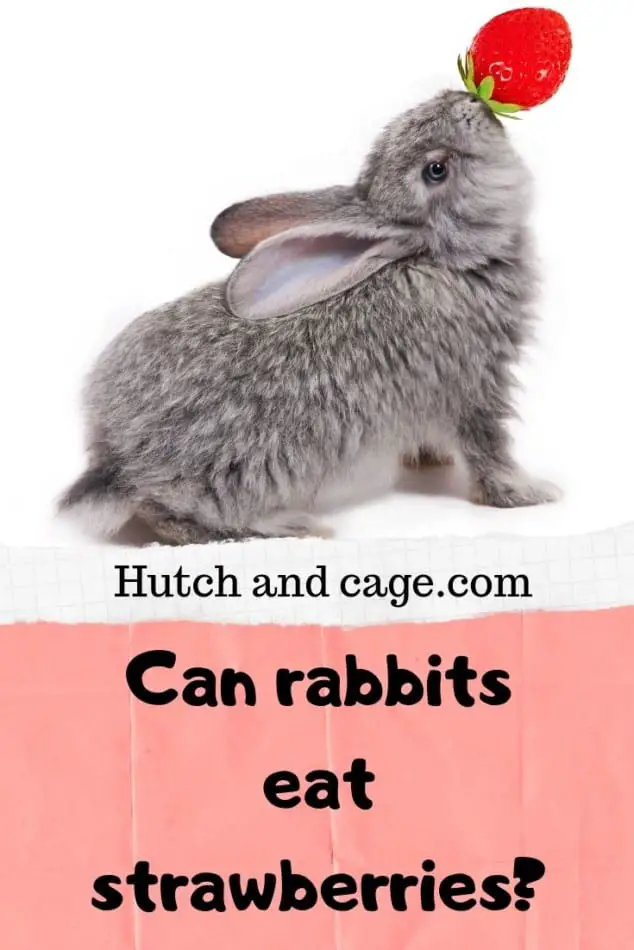
Instead, portion out strawberries carefully. Below are some popular fruits that rabbits can eat, benefits they may have, and the right servings, starting with strawberries.
Table of Contents
Rabbits Can Eat Strawberries And Love Them Too
An average-sized bunny should have no more than 1-2 tablespoons of strawberries a day.
The strawberries can be offered sliced, diced or even whole.
A medium-sized strawberry is roughly 1-2 tablespoons.
For smaller rabbits, take care that the bits are not a choking hazard – judge the size accordingly.
Strawberries should be offered fresh, as dried ones are not suitable for a bunny.
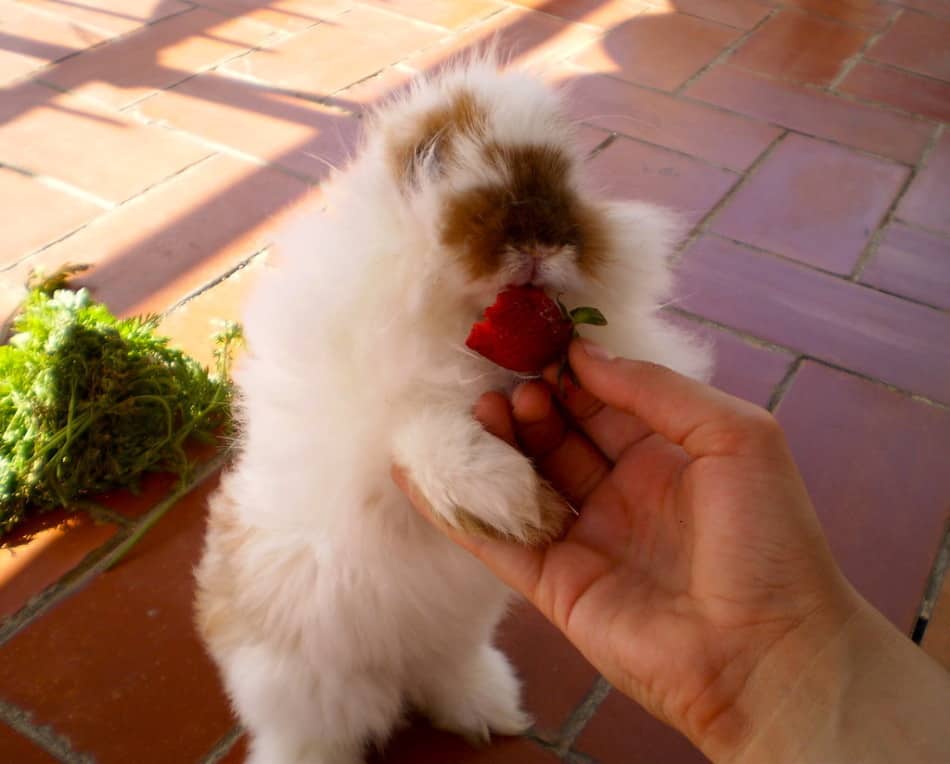
Raspberries Are Another Lovely Treat For A Bunny
Rabbits can have a few small raspberries at a time, and once to twice a week.
As with all fruit, rinse the raspberries thoroughly to eliminate pesticides and the like.
Once the raspberries are clean and ready to go, give a couple to your bunny. Their mouth is sure to be colored red from the raspberries because the fruit is so juicy.
This is a cute sight to see as your friend munches contentedly.
Blueberries Are Packed With Antioxidants For Your Bunny
A fun food to feed your small fuzzy pet, blueberries portion themselves out well.
A few blueberries once to twice a week will suffice for a bunny.
You can tell that blueberries have high levels of antioxidants due to their rich colors of purple and blue.
Antioxidants are extremely healthy for humans, and rabbits, too. Blueberries are also said to aid with cell repair and the like.
These aspects make blueberries not only a treat for rabbits but nutritious as well.
Blueberries are even known to have a low glycemic index, so, for a fruit, they are relatively easy on the system of a bunny.
Blackberries Are A Safe Fruit That Rabbits Really Like
Another fantastic fruit for rabbits are blackberries. Rich in antioxidants, these berries are best administered when they are fully ripe, but not overripe.
Under-ripe berries can give humans and rabbits alike a tummy ache. Ripe berries, however, are sure to make your rabbit very happy.
Rabbits seem to particularly love fruits that are really juicy – like strawberries. Berries of all kinds, to rabbits, are like candy. They make an excellent treat, and one that is definitely healthier than most rabbit treats at the store.
For a medium-sized rabbit, offer 2-3 medium-sized blackberries; for a smaller rabbit, 1-2 medium-sized blackberries.
This serving can be given to your bunny 1-2 times weekly.
Soft And Fuzzy Rabbits Can Eat Soft and Fuzzy Peaches
Peaches are a tad less sugary than their strawberry counterparts, so they can be fed to your rabbit a bit more frequently. A few small pieces 2-3 times a week is usually okay.
A good thing to do when introducing new foods, fruit or otherwise, is to test a small portion on your rabbit initially. Offer a sliver of fruit and watch for reactions for a day or so.
If all seems clear, you can feed them more from there.
Whether you are introducing your rabbit to strawberries or peaches, always keep an eye on your pet. Make sure to feed your bunny only one new food at a time.
This way, in the case of a reaction, you can easily pinpoint the cause.
Apples Can Be Nutritious for Rabbits
This tree fruit is a very healthy rabbit snack! Apples are chock-full of fiber, to help meet the needs of a rabbit’s dietarily.
The fiber in an apple also helps slow down the spike from the sugar that occurs in apples naturally.
Caution, though: apple seeds contain cyanide, which is toxic to humans and rabbits alike. The difference is that, while it is not recommended, humans can ingest a few seeds with little consequence.
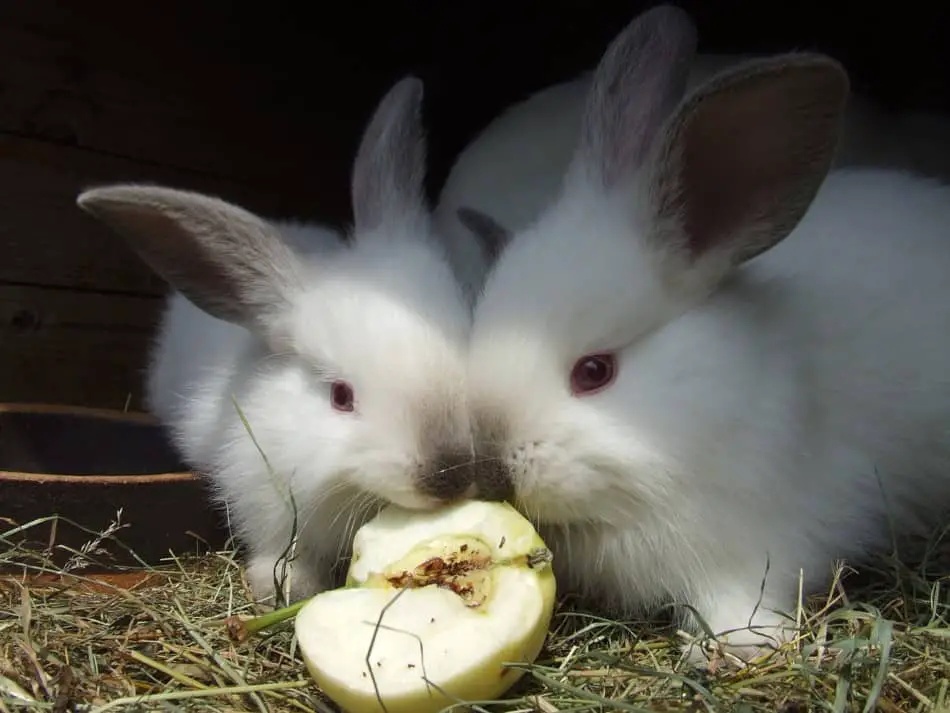
These seeds, however, are a much higher dose for a bunny. Because of this, the seeds will affect them more seriously and harmfully.
Remove the seeds prior to feeding any apple to your rabbit to eliminate the risk entirely.
A rabbit may have a few small slices of apple up to three times a week.
Read our article all about rabbits eating apples here for more information on this subject.
Pears Are Another Fine Treat For Your Bunny
Pears are very high in sugar. The crisp and soft tree fruit will likely be a hit with your bunny. Like strawberries and other berries, pears should be given to your rabbit only 1-2 times weekly.
The general rule is 1-2 teaspoons of pear per 2 pounds of body weight for your bunny.
Let Your Rabbit Give Cherry A Try
This is a fruit advised you give to adult rabbits only. Cherries are very high in sugar. Still, most kinds are not toxic to rabbits and can be enjoyed infrequently. 1-2 times a week is plenty.
Remember that the 2-3 times a week rule with fruit does not mean fruits are something you can mix. Offer no more than one serving of fruit of any kind per day, a few times weekly.
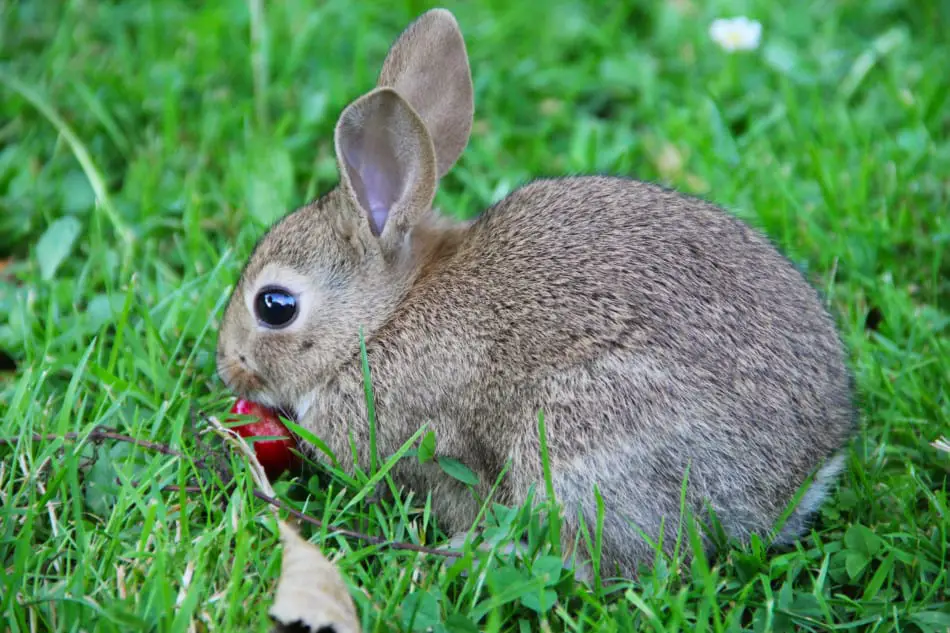
As you can see, rabbits can eat much more than just strawberries. Your rabbit is sure to take a liking to many of the fruits listed above.
Simply be sure to never exceed the advised portions, and decrease the amount accordingly if you have an especially small bunny.
The consequences of overfeeding your rabbit with sugar and starches can be deadly. Rabbits maintain a very delicate digestive balance.
Disturbing this with excess sugar is all too easy. Generally, you will want your rabbit to have constant access to hay. Vegetables can be fed frequently, several times weekly.
Fruit, on the other hand, should be offered only 2-3 times, at most, a week. Once again, and as with human treats and candies, moderation is key.
Some Fruits And Other Produce Are Dangerous To Rabbits
Some fruits and other produce are quite toxic to rabbits, and can even prove deadly.
There is importance in being aware of these fruits and other produce, so that you can avoid them completely.
In the wild, rabbits have the street-smarts to avoid poisonous plants, mostly.
A domesticated rabbit will be more curious and less wise. Without due care, this can have disastrous results for your bunny.
Be sure to keep all plants that are toxic to your bunny in the yard fenced off appropriately. Keep house plants up high and out of reach.
Fruits and other produce that are toxic to rabbits are listed below.
Some Common Fruits And Other Produce Are Toxic To A Bunny
Onions Are Extremely Toxic to Rabbits
Fortunately, the smell of onions acts as a natural repellent to the little guys. Because rabbits avoid onions naturally, they will typically only sample them if they are the only food around the place.
There is no reason really that your rabbit would ever be so desperate.
This in mind, onions are not as risky to have around rabbits as some… but for your peace of mind and to eliminate risk, you should have them fenced off anyway.
The additional security is due to the serious complications that onions can cause if ingested by a bunny. In rabbits, anaphylactic shock and hemolytic anemia occur swiftly.
Iceberg Lettuce Is Bad For Rabbits
When you are thinking of something healthy to feed your rabbit, and the choice is between strawberries and iceberg lettuce, you may think iceberg lettuce the better choice.
Actually, strawberries are just fine and even somewhat nutritious for rabbits when portioned properly.
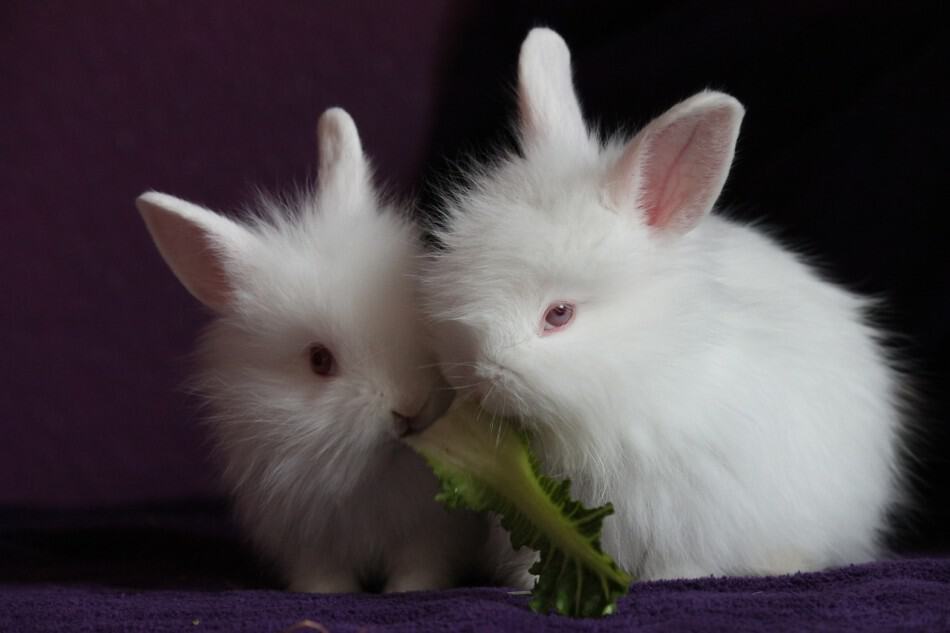
Iceberg Lettuce on the other hand, no matter the amount, will affect your rabbit harmfully. You see, lettuce contains little to no nutrients, really.
This makes it a waste of stomach space for a bunny, and it can even cause diarrhea.
The real danger, though, is the lactucarium contained in iceberg lettuce, especially the wild variety. To rabbits, lactucarium acts as a toxic sedative.
All Mushrooms Are Poisonous To Rabbits
Never feed your rabbit mushrooms! Many kinds are poisonous even to humans, and far more will harm a bunny.
A little known fact is that rabbits cannot vomit, which means that, should they ingest something as toxic as mushrooms, it will likely prove deadly.
If you are growing mushrooms in your garden, keep them well fenced-off and up high, ideally.
Rabbits will usually turn their noses up at mushrooms, but leaving such a poisonous plant unprotected is really not worth the risk.
Almonds Are Useless To Rabbits And Can Even Be Harmful
Like apple seeds, almonds contain cyanide. In a certain amount, this can cause cyanide poisoning in a bunny.
Along with this huge downside, almonds offer little to no nutrients or fiber and are high in fats, which to a rabbit are useless, basically.
Nuts, in general, are not recommended for your bunny. Fat is not something that they can digest very easily, and nuts will offer no value nutritionally.
Wild Vegetables Are Not Good For Rabbits
While rabbits can safely enjoy store-bought carrots as a treat, wild carrots, on the other hand, are toxic. Also toxic are wild peas, wild cucumbers, and wild parsnip.
This may come as a surprise since rabbits eat wild food naturally.
Actually, rabbits eat 80-90% hay. They do not typically eat root vegetables or a lot of the produce that domesticated rabbits have access to today.
It makes sense, then, that they are allergic to some of these. So, when feeding your rabbit fresh produce, use all due care.
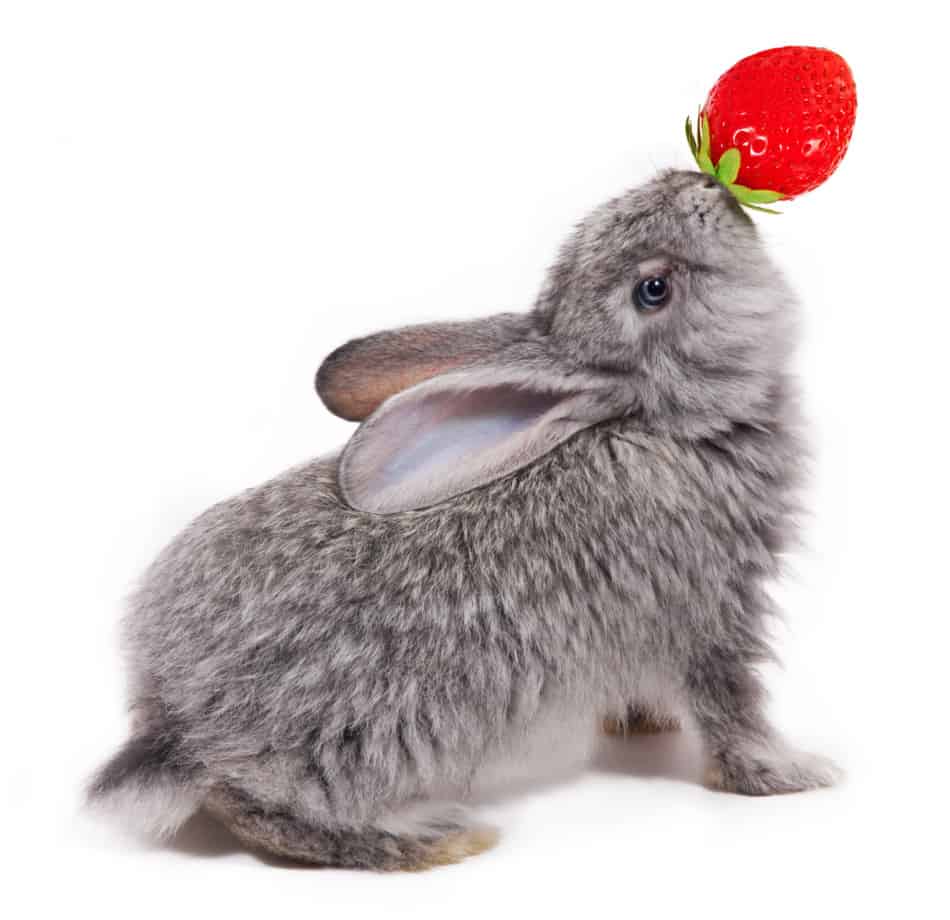
Conclusion: Can Rabbits Eat Strawberries?
As you can see, strawberries are just one of the many tasty fruits that rabbits may safely enjoy. Some fruits, like blueberries, even contain antioxidants and nutrients that are vital for a bunny.
Fruit is a fantastic choice for rabbits, and your little buddy is sure to get excited on treat day, 2-3 times a week.
You also now know to avoid some common but surprisingly toxic fruits, veggies and other produce.
Little joys like treats are what makes life worth living, especially for animals.
They are very simple creatures, with basic needs, and rabbits are no exception. Strawberries, blueberries, blackberries or the like a few times a week is a simple but great way to make your pet happy

